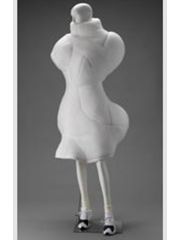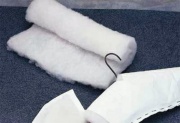Difference between revisions of "Batting"
| Line 26: | Line 26: | ||
== Resources and Citations == | == Resources and Citations == | ||
| + | * Pellon Projects: [https://www.pellonprojects.com/wp-content/uploads/2013/03/Batting-FAQs.pdf Batting FAQs]; [https://www.pellonprojects.com/wp-content/uploads/2015/11/PellonBattingChartNEW.pdf Batting Comparison] | ||
* Rachael Perkins Arenstein, Lisa Goldberg, and Eugenie Milroy, ‘Support and Rehousing for Collection Storage’ In ‘Preventive Conservation: Collection Storage’ Lisa Elkin and Christopher A. Norris (eds.), Society for the Preservation of Natural History Collections, New York. 2019. | * Rachael Perkins Arenstein, Lisa Goldberg, and Eugenie Milroy, ‘Support and Rehousing for Collection Storage’ In ‘Preventive Conservation: Collection Storage’ Lisa Elkin and Christopher A. Norris (eds.), Society for the Preservation of Natural History Collections, New York. 2019. | ||
* [https://www.nps.gov/museum/publications/conserveogram/18-02.pdf?pdf=18-2 Safe Plastics and Fabrics for Exhibit and Storage], Conserve O Gram 18/2, National Park Service, September 2010. | * [https://www.nps.gov/museum/publications/conserveogram/18-02.pdf?pdf=18-2 Safe Plastics and Fabrics for Exhibit and Storage], Conserve O Gram 18/2, National Park Service, September 2010. | ||
Revision as of 11:55, 8 November 2023
Description
A soft cushion of loosely matted fibers. Batting is used for padding and insulation in upholstered furniture, cushions, packing, and quilts. It is usually made from Cotton, or Polyester, and occasionally Wool. For museum applications, 100% heat-bonded polyester batting is recommended. Some battings that are resin bonded may include materials that off-gas or attract pests.
Synonyms and Related Terms
batt; stuffing; wadding; padding, Pellon
Applications
- Cushioning and fill in cavities around stored or packed artifacts
- Incorporated in padded textile hangars or stockinette tubes
Collection Risks
Batting fibers can easily snag on small object parts. Additionally, polyester fibers may be abrasive. This may be mitigated by separating batting from the object with a fabric or non-woven layer.
Physical and Chemical Properties
Polyester is non-absorbent, pest resistant, and provides cushioning 'memory'
Working Properties
Cotton fibers are hygroscopic and may provide some humidity buffering, but the cotton batting tends to flatten with time and may also attract insects. (PACCIN)
Forms/Sizes
Roll lengths vary and widths typically 40” or 45” up to 90”. Thickness (referred to as "loft") ranges from .007” to 1”. Can easily be stacked to achieve more substantial thicknesses. Some versions provide easily separable layers.
Resources and Citations
- Pellon Projects: Batting FAQs; Batting Comparison
- Rachael Perkins Arenstein, Lisa Goldberg, and Eugenie Milroy, ‘Support and Rehousing for Collection Storage’ In ‘Preventive Conservation: Collection Storage’ Lisa Elkin and Christopher A. Norris (eds.), Society for the Preservation of Natural History Collections, New York. 2019.
- Safe Plastics and Fabrics for Exhibit and Storage, Conserve O Gram 18/2, National Park Service, September 2010.
- Preparation, Art Handling, Collections Care Information Network (PACCIN)
- Marjorie Shelley, The Care and Handling of Art Objects, The Metropolitan Museum, New York, 1987
- Hoechst Celanese Corporation, Dictionary of Fiber & Textile Technology (older version called Man-made Fiber and Textile Dictionary, 1965), Hoechst Celanese Corporation, Charlotte NC, 1990
- Fairchild's Dictionary of Textiles, Phyllis G.Tortora, Robert S. Merkel (eds.), Fairchild Publications, New York City, 7th edition, 1996
- The American Heritage Dictionary or Encarta, via Microsoft Bookshelf 98, Microsoft Corp., 1.998
- Art and Architecture Thesaurus Online, https://www.getty.edu/research/tools/vocabulary/aat/, J. Paul Getty Trust, Los Angeles, 2000


